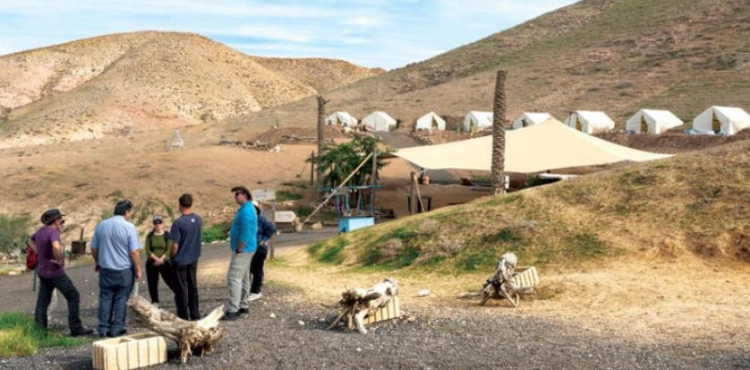Harbi Abu al-Kabbash, a resident of the Jordan Valley in the West Bank, looks with sorrow and anger at two water wells that the Israeli army has erected around a barbed-wire fence and set up surveillance cameras to prevent him and other residents from using them.
Abu Kabash lives in Khirbat (Homsa) in the Jordan Valley, which is the subject of heated conflict between the Palestinians and the occupation entity.
Palestinians complain of the escalation of the occupation activities and the confiscation of land in the Jordan Valley in order to implement its plan to impose its sovereignty on the area.
Abu al-Kabbash says that about 19 Palestinian communities in the Jordan Valley are forbidden by the Israeli army from using water wells, turning their lives into hell.
Empty a water tank in tanks and barrels to water his cattle, he needs about 10 glasses of water a day in winter, while it needs 14 to 15 cups in the summer.
Abu al-Kabbash points out that his family of 40 is totally dependent on agriculture and livestock.
Abu al-Kabash is forced to travel at least 20 kilometers a day to and from the nearest water point, Palestinian officials say.
According to the governor of the Jordan Valley in Tubas and the Jordan Valley, Moataz Bisharat, the Israeli army recently destroyed at least 3.7 kilometers of water lines that supply Palestinian farmers with water, in addition to three reservoirs that provide water to the communities.
Bisharat said the army also demolished six water-harvesting wells and destroyed only about 4 km of inland water systems this year.
He explained that the Palestinian Authority, having canceled the classification of areas in the West Bank, is trying to extend water lines to communities, "but face these efforts by rejecting the occupation and the repeated destruction of water lines."
Palestinian residents angrily point to Israeli water lines that extend into their land to deliver water to settlements while preventing them from using them.
In 1973, the Israeli authorities allowed the villages of Bardala, Kardala and Al-Ayn al-Bayda to supply 250 cups of water a day after digging wells that affected the flow of water to the Palestinians.
Since that year, the occupation has not increased the proportion but reduced it to 220 Cubans in favor of three villages, despite the increase in population and the natural growth of the population in the area.
Mehdi Daraghmeh, the head of a local council of mudarib and the Jordan Valley, says Israel´s policy of depriving Palestinians of water is aimed at driving the displacement of the Palestinian population.
Daraghmeh said 19 Palestinian communities in the Jordan Valley were completely deprived of water and residents had to travel about 20 km to fetch water through expensive tanks, especially in the summer.
He pointed out that this was accompanied by an escalation in the establishment of outposts in the private Palestinian territories, which are provided with water and electricity services immediately from the competent occupation authorities.
"One settler establishes an outpost and brings 400 heads of cows and large swaths of land that can be supplied with more water than the rest of the 2,800 Palestinian communities," he says.
He added that the residents´ dependence was on water springs, but they were totally drought due to frequent use and lack of rain, as well as the impact of wells drilled by the Israeli water company.
The Jordan Valley, which covers an area of ​​approximately 720,000 dunums, constitutes 30 percent of the West Bank area.
There are 31 Israeli settlements, most of which are agricultural and inhabited by more than 8000 settlers.
Palestinians see the Jordan Valley as a vital part of a future Palestinian state as the food basket of the West Bank and its external borders with Jordan.
On the other hand, Israel has repeatedly announced, through its Prime Minister Benjamin Netanyahu, its intention to impose its sovereignty over the entire Jordan Valley, on the grounds that it is linked to its long-term security.












